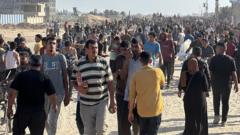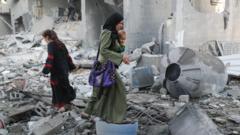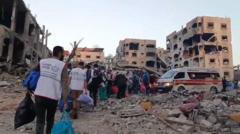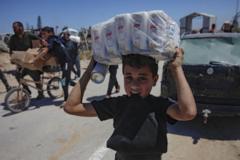In a recent BBC interview, UN humanitarian chief Tom Fletcher asserted that Israel's actions in Gaza amount to forced starvation, raising alarms over potential war crimes. Despite a slight easing of the blockade allowing limited aid, desperation continues, leading to chaos at distribution centers. International criticism is mounting against Israel's military strategies as humanitarian needs intensify amidst ongoing conflict.
UN Official Declares Gaza Faces Humanitarian Crisis as Forced Starvation Intensifies
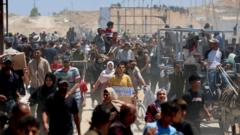
UN Official Declares Gaza Faces Humanitarian Crisis as Forced Starvation Intensifies
The situation in Gaza becomes critical with reports of forced starvation, prompting urgent responses from international leaders and humanitarian agencies.
The UN's humanitarian chief, Tom Fletcher, has voiced alarming concerns regarding the situation in Gaza, asserting that Israel is subjecting the region to forced starvation. Speaking to the BBC, Fletcher indicated that such actions might qualify as war crimes, encouraging global scrutiny and potential judicial reviews. In a moment of introspection, he expressed regret over a previously made statement about a looming crisis that could endanger the lives of 14,000 infants if urgent aid did not reach Gaza.
Following an almost three-month blockade, Israel has recently permitted limited aid into Gaza. However, this easing occurred alongside an intensification of military actions against Hamas, which had previously spurred a fragile two-month truce. These decisions were framed by Israel as necessary pressure tactics to secure the release of 58 hostages believed to be held by Hamas, with reports suggesting at least 20 remain alive.
Upon allowing some aid into Gaza, reports surfaced of chaotic scenes at distribution centers managed by the Gaza Humanitarian Foundation, which is supported by both the US and Israel. The UN maintains an independent stance and does not collaborate with this organization. A recent incident left 47 individuals injured when overwhelming crowds attempted to access the limited resources made available. Fletcher emphasized that food supplies are available but are being withheld, further exacerbating humanitarian needs in a starving population.
He critiqued statements made by Israeli Finance Minister Bezalel Smotrich, advocating for Prime Minister Benjamin Netanyahu to distance himself from rhetoric suggesting forced displacement and desperation among Gaza residents. "We anticipate the world will uphold international humanitarian law without exception," Fletcher remarked.
With growing discontent in the international community towards Israel's military actions, remarks from EU leaders suggest that the latest strikes exceed what is considered necessary for combating Hamas. Notably, Fletcher pointed out that a coalition of UK, French, and Canadian leaders issued a demand for the cessation of military operations in Gaza and insisted that humanitarian aid must flow unobstructed.
As the pressure mounts, Fletcher urged action from the UN Security Council to prevent a potential genocide, reflecting on past humanitarian crises where inaction led to devastating consequences. He reiterated the compelling reporting from colleagues in Gaza, which highlighted forced displacements, starvation, and widespread casualties.
Israel has countered Fletcher's claims, alleging that his statements overlook Hamas's culpability and propagate false narratives. Despite the backlash, Fletcher reasserted the urgency of his message regarding the necessity for immediate aid, continuing to call for negotiation and resolution.
With an escalating death toll reported by Gaza's health ministry—54,249, including nearly 4,000 since the resumption of military action—Fletcher stressed the pressing need for humanitarian responses amid conflicts in several global hotspots. He described the current state as a "profoundly dangerous" juncture impeded by political divisions that hinder efforts to resolve conflicts and mitigate suffering amongst civilians.
The full details of Fletcher’s interview are set to be broadcast on the BBC News Channel on Saturday, underlining the urgent attention required for Gaza’s humanitarian crisis.


